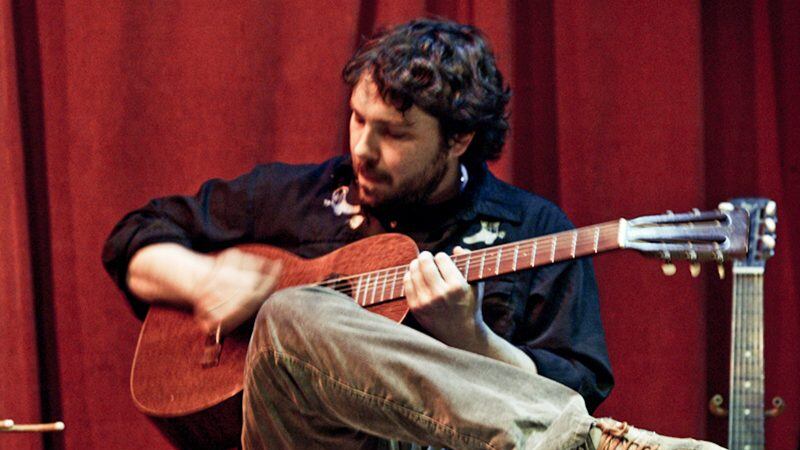A founding member of tastemaker-beloved avant-chamber pop combo Tin Hat, Mark Orton is no stranger to high-profile gigs, even after a midcareer shift from album release parties to red carpet premieres.
Ever since a fellowship at the Sundance Institute led Orton to compose the music for 2002 indie sensation The Good Girl, the longtime Portland resident has been asked to contribute original music to a dizzying range of projects, from Laika’s The Boxtrolls to Ken Burns’ The Roosevelts.
Still, Orton is best known for writing the spare, haunting, rootless score accompanying Alexander Payne’s Nebraska. And this Saturday, the composer will appear at the Hollywood Theatre to answer questions about his and Payne’s second collaboration, The Holdovers, an atmospheric character study frozen in time and place at a New England prep school at the dawn of the 1970s. He will also play music from the film, backed by a lineup of PDX music luminaries.
Orton is currently overseeing the imminent launch of a double-album soundtrack blending his original instrumental passages with era-appropriate FM hits from the film. Shortly after a meeting regarding the album, WW caught up with Orton on the shoulder of Interstate 5 and asked about the peculiar challenges of assembling retro soundscapes in the digital age.
WW: How and when did you start working with Alexander Payne?
Mark Orton: Years ago, I scored his film Nebraska. That actually came about after he’d been using some of my music from other movies and Tin Hat as temp [score] for the early edits. Time went by, he just really loved it and couldn’t divorce the music from the film. He knew I was a composer and got in touch to have me flesh out (and reorchestrate and rerecord) what he’d already been using.
Did Payne ask you for something similar for The Holdovers?
Um, no. This isn’t just a period film per se. What they set out to do was make a film as if it were 1970. It’s not just a conceit. It really permeates all aspects of the entire film.
Meaning, like, vintage equipment?
More than that. I mean, it’s to the extent where the literal soundtrack on the film itself was in mono, like it would’ve been in 1970. Forget Dolby Atmos, the soundtrack is actually mono, which is really something. Trying to mic a piano mono wasn’t a very fun challenge for Mark the engineer, but it really does bring you back to that town and that time.
So, truthfully, my job with this—much more so than Nebraska, which he saw as Italian cinema on the plains—was about putting us into this prep school in Western Massachusetts in 1970, turning 1971, where these kids are holding over for the winter break.
I mean, I lived in the part of the world where this was filmed. I drove those roads around Western Massachusetts. It’s one of my favorite places in the world—a close second to Portland when I was deciding where to live. So, yeah, I took real pleasure in [evoking] that side of things.
Tonally, is this more comedic?
About a third of the score ties into the humor and the place and the fact that they’re held over and, you know, Christmas—there are literal sleigh bells. Another third gets into the drama and melancholy. The scoring’s more thematic, but still rootsy and organic—not the big orchestral sound, something like a Jim Croce or Cat Stevens B-side.
I wanted the music to be able to meld with Allman Brothers and Badfinger and feel comfortable with a heavy source score that has lots of songs. For that last third of the score, I’m actually using a rock band with horns and writing instrumental rock music that feels of the era. For me, that was super fun. I never get to do that, you know? Go back and pull out my Gibson Les Paul to actually use on a score instead of noodling in the dark?
I brought in some really great players, and many of them will be at the Hollywood event. Ryan Smith, the set designer, will talk a bit about the pre-production side.
Were there any favorite tunes they couldn’t use in the film?
It’s more what I wrote early on based on the script. Most of the time, in the early stages, I’m writing in broader strokes. Then, I can put on my arranger’s hat and spend more time making the material already there work with a particular performance or style of filmmaking that I didn’t foresee. It’s funny because now I have, like, a dozen early ‘70s tunes sitting in my library without a place to go.
The music’s near and dear to me. I’m a little young for 1970 stuff, but that was prime time for my brother. He’s eight years older, and I coveted his LP collection, which had all of the music we’ve been talking about—plus prog rock. So for me, the songs hit really close to home. Putting that hat on feels very much like connecting with a rooted nostalgia. None of it feels hollow.
That said, I think I’m destined to stick with film and studio these days. I won’t be leading a folk-rock band on the open road anytime soon.
SEE IT: Mark Orton will discuss The Holdovers at a screening at the Hollywood Theatre, 4122 NE Sandy Blvd., 503-493-1128, hollywoodtheatre.org. 7:30 pm Saturday, Nov. 11. $15.
